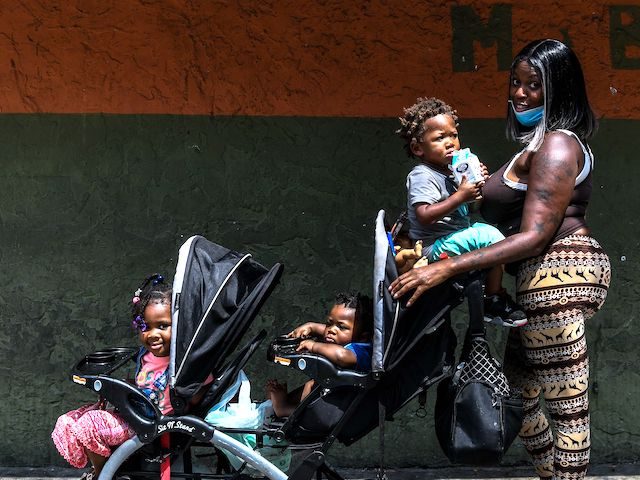TakeCharge, a black-led movement challenging Critical Race Theory (CRT) and woke culture, released data this week that obstructs the “racial disparities” narrative CRT proponents use to justify their agenda.
TakeCharge noted data uncovered in April 2019 from the U.S. Census Bureau and National Center for Health Statistics by American Enterprise Institute’s Mark Perry. The group tweeted the graph depicting “Median Household Income and Share of Births to Unwed Mothers by Race, 2017”:
“Proponents of CRT like to use racial income disparities to justify their agenda,” TakeCharge observed. “What they don’t tell you is that there’s a direct correlation between intact families & household income. One thing progressives disdain more than a gas guzzling SUV – the traditional nuclear family.”
In another tweet, TakeCharge asked, “Did you know … black students living with both married parents had suspension rates that not only were less than half as large as those for other blacks, but also less than the suspension rate for white students from families that weren’t intact?”
The group cited a 2019 study conducted at the Institute for Family Studies (IFS) that found unstable family structure, including chaotic households and single-parent homes, is a primary factor in racial disparities in school behavior and suspensions.
Breitbart News reported the study’s authors asserted education policymakers “must recognize that social and psychological problems in youth may manifest themselves at school but have their origins in family situations over which the school has little or no control.”
Proponents of CRT are quick to make the accusation that “systemic racism” and “white supremacy” are the cause of racial disparities in school discipline.
“Children of color face harsher standards for discipline and punishment from their first day in the classroom,” read a piece published from Axios Saturday, claiming the discrimination begins in preschool.
“Black youth, particularly boys, are more likely to be suspended and expelled from school than their peers,” Marc Schindler, executive director of the Justice Policy Institute, said. “Folks have viewed that as the start of the school-to-prison pipeline.”
Axios reported the following statistics:
Black children constitute 18% of preschoolers but account for about half of out-of-school suspensions. And Latino kindergarteners are four to five times more likely to get suspended than their white non-Latino peers.
The IFS researchers found in their analysis of the National Household Education Survey (NHES) that in 2016, about 24 percent of black elementary and high school students had been suspended at least once, while eight percent of white students and only four percent of Asian students had the same experience.
The researchers noted, however, the NHES shows “black students are far more likely to be living apart from their married birth parents in the home (72%) compared to white students (37%) or Asian students (26%).”
“These family structure differences, then, are likely to play a role in inter- and intra-racial disparities in student conduct and discipline,” the IFS authors stated and noted especially:
Indeed, among black students who do live with both married birth parents, suspension rates are less than half as large as those for black students living in other family types: 12% versus 28%. The suspension rate for black students living in intact families, 12%, is also less than the suspension rate for white students from non-intact families, 13%.
The study also found that family structure even accounts for more of the racial disparities in school suspensions than socioeconomic factors.
When the researchers controlled for family structure, they discovered the racial disparities in school suspensions reduced by 55 percent. Controlling for socioeconomic status reduced the racial differences by only 38 percent.
“These results, then, suggest that family structure is a signal factor in accounting for real differences in school conduct and school suspensions,” the authors concluded. “This is especially noteworthy because discussions related to racial disparities in school discipline often overlook the role of family structure and highlight socioeconomic explanations.”
“It’s insulting to hear that black people can’t get ahead because of systemic racism,” TakeCharge founder Kendall Qualls told the Minnesota Reformer in a Q&A interview in March.
The organization states it aims to build a coalition of supporters in communities and in academic and business sectors “to ignite a transformation within the Black community of the Twin Cities by embracing the core principles of America – not rejecting them.”
“These principles are embedded in the belief of hard work, education, faith, family, and free enterprise in the personal pursuit of dreams that can be realized by anyone regardless of race or social standing,” TakeCharge states.

COMMENTS
Please let us know if you're having issues with commenting.